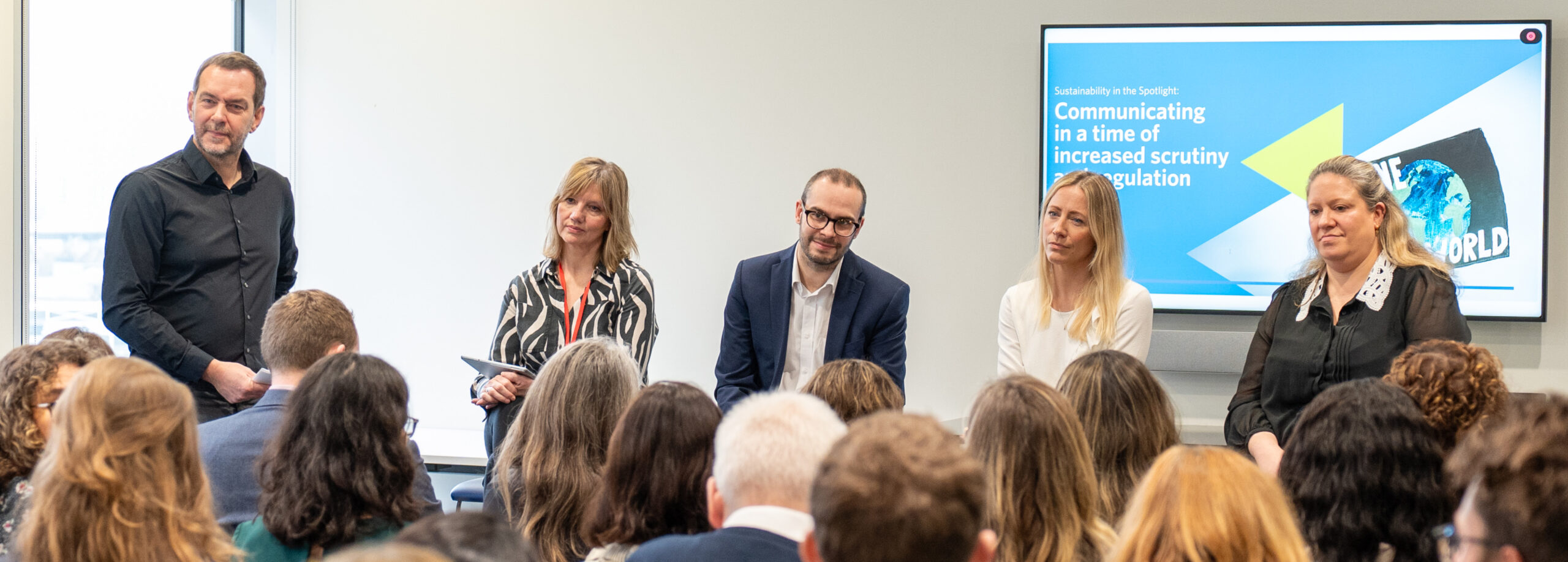What we learned from our panel discussion on sustainability regulation and communications in 2024

It’s difficult to do justice in just one blog, to a one-hour conversation with four experts that covered the highs and lows of sustainability communications, but in the following words we certainly try!
On Thursday 25th we hosted, Justine Grimley from the Advertising Standards Authority (ASA), Louisa Humm from Chivas Brothers, Alex Lawson from The Guardian and our very own Holly Rouse, to talk about the future of sustainability regulation and communication in 2024.
The context, with Storm Jocelyn blowing outside our office windows and dominating the news, was not lost on us. While climate has been on the agenda for a long time, we have seen a real shift in 2023 and now in 2024 in climate regulation and conversations. The days of ‘climate change’ feel behind us as we try and navigate the emerging ‘climate crisis’. Businesses clearly have their work cut out as they prepare for new regulation, continue to play their part and manage the increased scrutiny from Government, consumers, media and broader institutions.
So what did we learn? We were struck by 6 key themes that came up again and again.
1.Consumer understanding of sustainability terms remains low
The ASA has been conducting research into consumer understanding of prevalent sustainability terms such as ‘carbon neutral’, ‘compostable’, ‘net zero’ to inform how these should be used in future advertising. Overall, Justine explained that ASA research showed consumer confusion around the meanings of these claims and that participants in their study had called for them to be simplified and standardised. In particular, she highlighted that there was low consumer understanding of what carbon neutrality is, low understanding of what offsetting is and that consumers felt misled when the role offsetting was playing was explained to them.
This mirrored research that FleishmanHillard published last year, which looked at the importance British shoppers place on environmental sustainability and whether they understand many of the different environmental and sustainability claims out there. Encouragingly, despite the cost-of-living crisis, we found that over 55% of British shoppers still felt environmental sustainability was important when making a purchasing decision. Less positive was the lack of understanding around the saturation of sustainability terms and claims that exist today. Of course, simple claims like recyclable or ‘made with less’ were understood, but people had much less confidence in things like ‘certified carbon neutral’ or carbon negative.
Key takeaway: Business and consumers need to speak a shared language. Sustainability claims need to be easily understood, avoid jargon and use simply phrases.
2.Increased regulation and the introduction of AI is on the horizon
According to Alex, a main issue that businesses will need to contend with are the new disclosure standards coming into force in 2024. And clearly many already are. Louisa highlighted that at Chivas, they are currently readying themselves for The Taskforce on Nature-related Financial Disclosures (TCFD). She explained that as a business they welcome these new standards and that going through the process had been a positive experience and helped improve Chivas’ own data. However, she also acknowledged that this takes a lot of work and time, and that the increasingly complex reporting landscape means businesses need to stay on top of upcoming and incoming new regulation (including possible reporting that may come into force for the Taskforce on Nature-related Financial Disclosures (TNFD)).
This coupled with the rise of AI, provides an interesting shift in managing reporting and communication around sustainability. In particular, we were fascinated to hear Justine talk about how the use of AI will allow the ASA to expand its monitoring of ads to over 10 million in 2024 alone.
Key takeaway: Change is the constant when it comes to sustainability reporting; ensuring teams are looking ahead and taking the time to plan is key.
3.Climate remains key, but a new focus emerges on nature and biodiversity
While climate continued to be a focus of the discussion, several panellists talked to the increasing interest in nature. In particular, Louisa mentioned that climate was key in 2023 but with many concrete plans now laid down for net zero, she expects a shift in focus to nature across the industry and at Chivas – looking at how companies can better protect biodiversity and natural habitats.
The new buzz term – Nature Positive – was also mentioned. Nature Positive is a global societal movement defined as ‘Halt and Reverse Nature Loss by 2030 on a 2020 baseline, and achieve full recovery by 2050’. To put this more simply, it means ensuring more nature in the world in 2030 than in 2020 and continued recovery after that.
While this will no doubt be a part of the sustainability conversation in 2024, in answer to a guest question around companies claiming to be ‘Nature Positive’, Justine suggested companies exercise caution around this term. Like any other sustainability claim, companies will need to ensure that this is evidenced and qualified.
Key takeaway: Expect to see more commitments around nature and biodiversity in 2024. First mover advantages in this space are likely to drive positive reputation.
4.In an election year, the continued politicisation of sustainability and ESG is to be expected
With more than half the planet’s population due to vote in a national election in 2024, it is expected that sustainability will become a focus of argument for many political candidates. The panel agreed that this will place even more emphasis on businesses to be the change agents as governments’ attention remains elsewhere.
The conversation also covered the ongoing need to depoliticise climate and the environment. With much of the population still associating green and net zero with job losses, there was understanding and agreement that corporates must continue to address that narrative.
Key takeaway: Pressure remains on businesses to drive the sustainability agenda in 2024, with the additional challenge of navigating upcoming elections and the misinformation that often surrounds such events.
5.Green hushing remains a key concern amongst businesses
We’ve all read and heard about companies that have come under fire from consumers, media and organisations for overclaiming or overstating their environmental credentials. It is therefore unsurprising, that many companies would rather lay low than communicate on sustainability for fear of getting it wrong. However, our experts agreed that more concerning than those overclaiming, is the risk of the increased scrutiny leading to green hushing.
The good news, as Holly shared, is that sustainability communication remains a priority for many of our clients. And in particular, an interest in more transparent communication, covering the positive milestones, while also talking more openly when projects or commitments have not delivered as expected. A brilliant example of this comes from Lego’s announcement in September last year to stop a project to make bricks from recycled drinks bottles, saying it would have led to higher carbon emissions over the product’s lifetime.
Key takeaway: Failures can deliver the same reputational benefits as significant positive announcements when it comes to sustainability, so long as companies are being transparent and honest about their journey and commitments. What’s more, if companies are concerned about a new campaign, the ASA offers a free 24 hours turn-around bespoke advice service. Run by a team of experts they review concepts, imagery and/or copy to help establish any potential issues before the time and resources are spent taking the idea forward.
6.Sustainability stories will continue to be a focus for journalists
While we have all read about green fatigue, Alex reassures us that sustainability stories remain as important in 2024 as in previous years. He also offered some top tips on what he is looking for when writing a piece:
- Share positive stories – contrary to popular belief, people want good news stories and these read very well. Continue to think about new innovative sustainability stories you can share.
- Think beyond 2030 and 2050 – The average CEO tenure is short – announcements around 2030 and 2050 goals therefore doesn’t always mean much. Instead, consider shorter unexpected and clear roadmaps, for say 2027.
- Use your CEO – while journalists are happy to talk to sustainability experts, CEOs are a huge draw. Use them to drive the right story.
- Develop a clear media strategy – be thoughtful in your media approach. Consider where your story should appear in the paper or online and deliver a bespoke exclusive to that team.
What next?
We hope these key takeaways give you as much food for thought as they did for our team in the room. If you are looking for support with your sustainability comms, please get in touch. We hope to be hosting another brilliant discussion on sustainability communication later this year.
Rima Sacre, Director, Corporate Communications, Fleishman Hillard UK
Find Out More
-
Achieving Outsized Impact by Building Stronger Country Reputation
February 18, 2025
-
Corporate Affairs Trends for 2025
December 17, 2024


